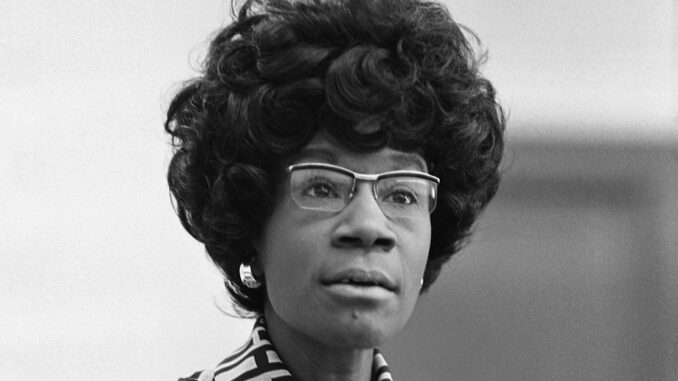
Shirley Chisholm.
After the 2008 election and subsequent inauguration of the nation’s first African American president, some of the excitement has dwindled. This should allow us to recall one of the pioneers who broke a political barrier when she became the first African American woman in the US Congress, and the first black woman to run for president: Shirley Chisholm.
In 1972, Congresswoman Shirley Chisholm, a black woman, campaigned for the Democratic nomination that had long been closed to African Americans and females. Shirley Chisholm’s tenacity took her from New York schoolteacher to Congress. Her determination and wherewithal allowed her to run for president, to bring scores of otherwise uninterested people into politics, and to open the door for future candidates. Shirley Ann (St. Hill) Chisholm was born in 1924 in New York City to parents of West Indian decent. After attending Columbia University and working as an educator, she served in the state legislature. By 1968, she had her eye on serving in Washington.
Chisholm overcame the odds in her first congressional campaign. A handful of black men had served in Congress during Reconstruction and in the modern era. Some white women, too, had won congressional races. But no black woman had yet obtained the office. She began her candidacy in a gerrymandered district with a watered-down black vote and with scant support from local politicians who shied away from endorsing her because she was “hard to handle.” She already had a tell-it-like-it-is reputation not beholden to power brokers. Her slogan was “Chisholm: Unbought and Unbossed.”
New York Republicans felt confident with James Farmer, the former chairman of CORE, Congress on Racial Equality. With an African American opponent, gender was more of an issue than race. Chisholm recalls in her memoir how Farmer’s campaign ran her down as a “bossy female,” and laments how tremendous amounts of talent were lost in many endeavors “just because that talent wears a skirt.” The dominance of female voters and Hispanics in the district—Chisholm minored in Spanish in college—allowed her to win by more than two-to-one.
Established white congressmen were cold to her. She set out on a legislative crusade for minorities, the inner city, education, and women’s rights. By mid 1971 she was contemplating a run for president.
Candidate Chisholm didn’t want to be noted for her race or gender, claiming at her 1972 announcement, “I am not the candidate of black America…I am not the candidate of the women’s movement…I am the candidate of the people of America.”
She ran a grassroots campaign against experienced candidates—Hubert Humphrey, Edmund Muskie, George McGovern, and George Wallace. One of her television ads showed her connecting with urban citizens with a background ballad, “If you’re looking for the road to freedom, take the Chisholm Trail.”
Her strongest supporters were younger activists who had otherwise not dabbled in politics. Current Congresswoman Barbara Lee (D-CA) recalls how Chisholm influenced her while at Mills College in Oakland. “In those years,” Lee reflects, “we frequently talked about ‘the system,’ how unfair it was, and that it was all but impossible to overcome, particularly as African Americans.” Lee explains, “None of the white men who were running for president were addressing any of the real issues that mattered to me.” After a professor assigned her to work for a presidential campaign, Chisholm became the obvious choice. Lee brought her to campus and registered to vote for the first time.
In addition to new voters, Chisholm received support from leading feminists, more so than from leading black men. One campaign worker recalls “she felt like she was treated like an intruder” after speaking at the National Black Political Convention. Yet, feminist leaders Betty Freidan and Gloria Steinem worked for her. She campaigned in 11 primaries, received votes in 14 states, and earned 152 delegates at the Democratic National Convention in Miami, unfortunately a small fraction of those needed to win.
Chisholm realized her slim chances, but continued to bring attention to concerns of the unheard. “She told me that if you believe in justice, you have to take a stand and then work hard for what is right,” Representative Lee remembers. “Her comments have always stayed with me and even today guide me in my work in Congress.”
That loss was the last one for Chisholm. She went on to serve in the House until she stepped down in January 1983. In her memoir, The Good Fight, she said of people recalling her legacy, “I’d like them to say that Shirley Chisholm had guts.” That reputation had no doubt been established by this point; she won her challenge to debate Humphrey and McGovern on TV in California and survived threats to her life on the campaign trail.
More important than her legacy as a fighter is that of a door opener. Gloria Steinem wrote in the January 1973 issue of Ms Magazine “the Chisholm candidacy was not in vain…the American political scene may never quite be the same again.” And Chisholm said of her own effort, “next time a woman runs, or a black, a Jew or anyone from a group that the country is ‘not ready’ to elect to its highest office, I believe that he or she will be taken seriously from the start.”
Chisholm died in Florida on January 1, 2005. She nearly survived to see America’s first minority president.